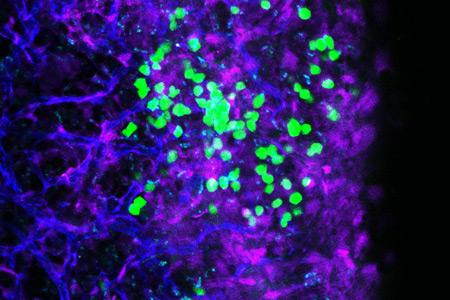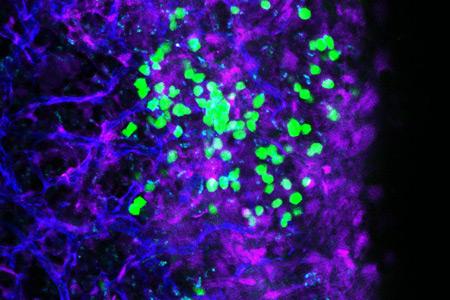
Credit: UC San Diego Health
Acute myeloid leukemia (AML) is an aggressive cancer known for drug resistance and relapse. In an effort to uncover new treatment strategies, researchers at University of California San Diego School of Medicine and Moores Cancer Center discovered that a cell surface molecule known as CD98 promotes AML. The study, published October 27 by Cancer Cell, also shows that inhibiting CD98 with the therapeutic antibody IGN523 blocks AML growth in patient-derived cells and mouse models.
"To improve therapeutic strategies for this disease, we need to look not just at the cancer cells themselves, but also at their interactions with surrounding cells, tissues, molecules and blood vessels in the body," said co-senior author Tannishtha Reya, PhD, professor of pharmacology at UC San Diego School of Medicine and Moores Cancer Center. "In this study, we identified CD98 as a critical molecule driving AML growth. We showed that blocking CD98 can effectively reduce leukemia burden and improve survival by preventing cancer cells from receiving support from the surrounding environment."
Reya led the study together with Mark Ginsberg, MD, professor of medicine at UC San Diego School of Medicine and Moores Cancer Center. Co-author Edward van der Horst, PhD, senior director at Igenica Biotherapeutics Inc., provided the anti-CD98 antibody IGN523.
AML is a type of cancer in which the bone marrow makes abnormal white blood cells, red blood cells or platelets. Reya's team and others have previously shown that leukemia cells interact with their surroundings in the body via molecules on their cell surfaces, and that these interactions can help the cancer cells divide, replicate and metastasize.
CD98 is a molecule found on the surface of cells, where it controls how cells stick to one another. CD98 is known to play a role in the proliferation and activation of certain immune cells. CD98 levels are also known to be elevated in some solid tumors, and linked to poor prognosis.
To determine CD98's role in AML, in this latest study Reya's team engineered mouse models that lack the molecule. They found that the loss of CD98 blocked AML growth and improved survival. CD98 loss largely spared normal blood cells, which the researchers said indicates a potential therapeutic window. Further experiments revealed that leukemia cells lacking CD98 had fewer stable interactions with the lining of blood vessels — interactions that were needed to fuel AML growth.
Next, the researchers wanted to see what would happen if they blocked CD98 in AML with a deliverable inhibitor. In 2015, Igenica Biotherapeutics Inc. tested IGN523, a humanized antibody that specifically binds and inhibits CD98, in a phase 1 clinical trial at Moores Cancer Center and elsewhere. The trial's goal was to determine a safe dose for IGN523 administration in AML patients. In this study, Reya and team tested IGN523 in their own AML models.
The researchers found that IGN523 blocks CD98's AML-promoting activity in both mouse models of AML and human cells in the laboratory. They also transplanted human patient-derived AML cells into mice and treated the recipients soon after with either IGN523, the anti-CD98 antibody, or with a control antibody. Anti-CD98-treatment effectively eliminated AML cells. In contrast, AML in control mice expanded more than 100-fold.
"This study suggests that human AML can't get established without CD98, and that blocking the molecule with anti-CD98 antibodies could be beneficial for the treatment of AML in both adults and children," Reya said.
Moving forward, Reya and team are working to further define whether CD98 could be targeted to treat pediatric AML.
"Many of the models we used in this work were based on mutations found in childhood AML," she said. "While many childhood cancers have become very treatable, childhood AML continues to have a high rate of relapse and death. We plan to work with pediatric oncologists to test if anti-CD98 agents can be effective against pediatric AML, and whether it can improve responses to current treatments. I think this is particularly important to pursue since the anti-CD98 antibody has already been through phase I trials, and could be more easily positioned to test in drug-resistant pediatric AML."
The American Cancer Society estimates that there will be about 19,950 new cases of AML and about 10,430 deaths from the disease in the United States in 2016, mostly adults. Approximately 500 children are diagnosed with AML in the U.S. each year, and it's the most common second cancer among children treated for other cancers, according to St. Jude Children's Research Hospital.
###
Study co-authors also include: Jeevisha Bajaj, Takaaki Konuma, Nikki K. Lytle, Hyog Young Kwon, Jailal N. Ablack, Joseph M. Cantor, Elizabeth H. Broome, Edward D. Ball, UC San Diego; David Rizzieri, Duke University; Charles Chuah, Singapore General Hospital; and Vivian G. Oehler, Fred Hutchinson Cancer Research Center.
Media Contact
Heather Buschman
[email protected]
858-249-0456
@UCSanDiego
http://www.ucsd.edu





